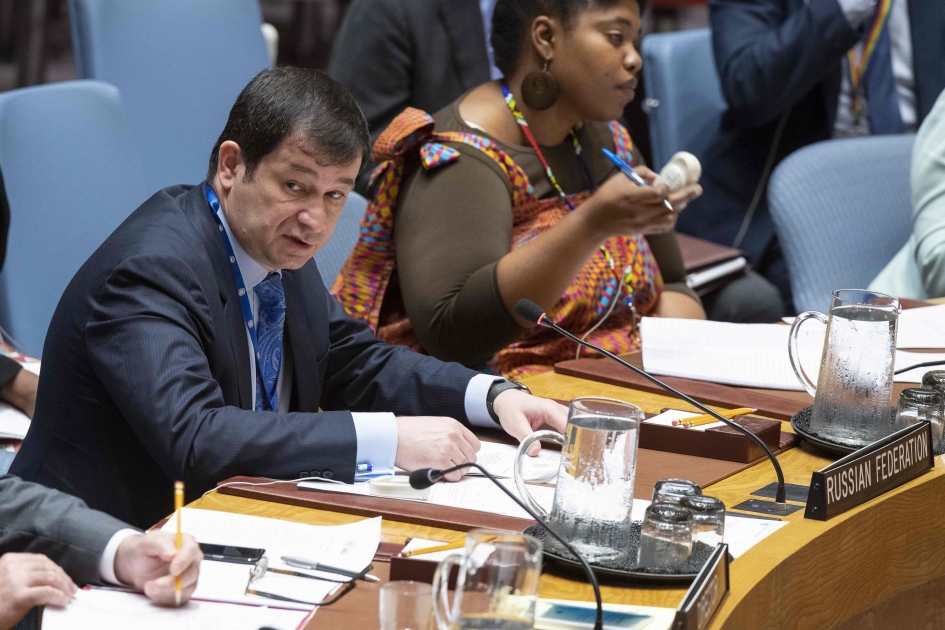Statement by Chargé d'Affaires of the Russian Federation Dmitry Polyanskiy at the UN Security Council meeting on children and armed conflict
Thank you, Mm. President,
Please, convey our words of gratitude to Foreign Minister Czaputowicz for his personal participation in this meeting. Let me also thank you for convening this open debate on such an urgent topic. I would like to avail of the opportunity and welcome our Chinese colleague Ambassador Zhang Jun as he begins his participation in the open meetings of the Council.
We are thankful to Special Representative of the Secretary-General for Children and Armed Conflict V.Gamba for her participation in this session and presentation of her assessments of the situation with protection of children in various countries. We thank UNICEF Executive Director Henrietta Fore. We have listened with interest to Ms.Kamara and Mr.Awan. What you were talking about is shocking. Such things must not be happening at our time.
Mm. President,
Russia expresses concern regarding the vulnerable status of children in many regions throughout the globe that are engulfed in armed confrontation. The report of the Secretary-General that we have just heard clearly illustrates this. It can be seen from the report that the most alarming situation has developed in Afghanistan, Yemen, Syria and some other States.
The Security Council takes consistent measures to protect children and prevent acts of violence against them. At the same time, in accordance with resolution 1612 of the Security Council and subsequent documents, closest attention should be paid to the six categories of gravest violations against children. This should be done both in the framework of the Monitoring and Reporting Mechanism and the Security Council Working Group on Children and Armed Conflict. Among such crimes are: recruitment and use of children as combatants, killing and maiming, abduction, sexual violence, attacks on schools and hospitals, denial of humanitarian access. It is these crimes that we should strive to counter in the course of our work. In light of this we are convinced of counterproductiveness of attempts to erode the mandate of the Security Council in this area by making it consider other issues related to rights of children in a broader context that does not have to do with maintaining international peace and security. Such issues are part of mandate of other UN bodies. The Security Council should not duplicate their competence. Only when we abide by the principle of division of labor, we will be able to be the most effective in solving children-related issues.
Mm. President,
Prevention of crimes against children is an important aspect of the package of measures on conflict settlement and post-conflict recovery. We appreciate and support efforts aimed at reintegrating children liberated from the armed groups. We highlight that the majority of States affected by conflict do quite a lot to improve the situation of children. They often need international assistance. However, it is the national governments that play the pivotal role in protecting children in armed conflict. The task of the UN thereby is to compliment and support those efforts. In this regard we are convinced that Security Council mechanisms can be efficient only when they have constructive cooperation with the country affected by armed conflict. Besides, resolution 1612 stipulates the role of national governments in the process of UN interaction with armed groups related to the protection of children. Underestimation of this requirement can lead to regrettable results, because leaders of armed groups may attempt to use contacts with UN bodies to legitimize themselves in the eyes of global community rather than to protect children.
Mm. President,
Russia expressly condemns children-related violations of the provisions of international law, international humanitarian law, human rights and rights of refugees. It is unacceptable to launch indiscriminate attacks, use UAVs, use civilians, children, schools and hospitals as coverage for terrorists, and have other sorts of violations of the international humanitarian law. All those responsible for such crimes must be duly prosecuted and held accountable.
The international humanitarian law comprises a large body of provisions aimed at protecting children and civil infrastructure during armed action. Efforts of the international community should focus on implementing these provisions. Primary responsibility in this area lies with the States.
We regret to note attempts to use children as tools of propaganda by involving them in various types of plotted and staged episodes. It is highly immoral, and it undermines the efforts of the international community to protect children in armed conflict.
In recent years, calls have become more frequent to join various declarations, guidelines or principles that have been developed outside the UN framework and that address separate humanitarian aspects. We believe participation of States in these documents is a matter of their good will. However, we would like to emphasize that such declarations, guidelines and principles cannot substitute for, correct or extend the universally acknowledged provisions of the international humanitarian law.
Mm. President,
Russia supports the activity of the Special Representative of the Secretary-General for Children and Armed Conflict. Your active and consistent position in terms of protection of children, aspiration to maintain constructive dialogue with the interested States make it possible to achieve notable progress. We also commend your unbiased and objective approach in registering and accumulating trustworthy information about violations against children that finds its reflection in the reports of the Secretary-General. We always carefully study this data and account for it in our work.
We call upon all Members of the Security Council to continue constructive cooperation for the sake of effective protection of children from the impact of armed conflict.
Thank you.
